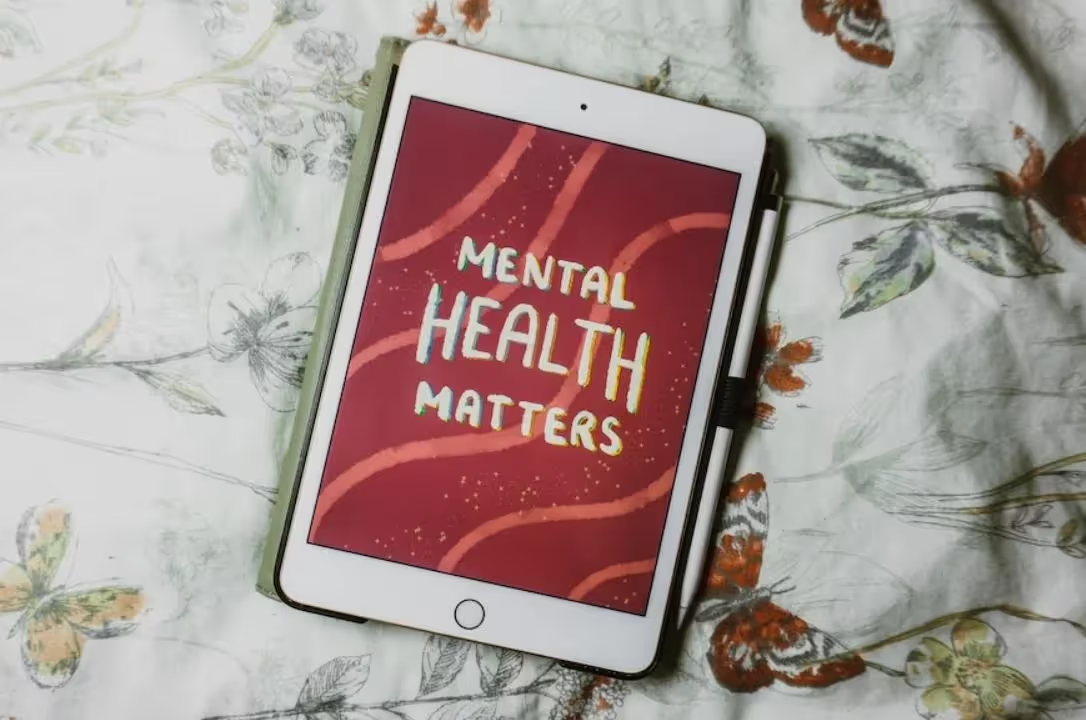Social Media and Mental Health: How Technology Use Can Have a Negative Effect on Well-Being
In this blog, we will explore the different negative effects that technology can have on the human psyche. As well as how to mitigate and even prevent them. Social media platforms aren't evil, but excessive use can lead to an array of mental health issues. Let's find out why together.

The average US adult spends 3 hours and 43 minutes on their mobile phone each day. Modern technology offers plenty of benefits
This might have seemed contradictory to what you usually hear about technology. But it’s true - online tools are making it easier than ever to access health services. This is relevant to the mental health sector which is experiencing a decline in professionals and access to care.
Although, this doesn’t mean all technology is good for us. In fact, just 5% of adults think that it’s brought only positive changes. Excess social media use can impact mental health in many ways. For instance, the way some people use social media can inadvertently have harmful effects on their overall wellbeing and self-esteem.
So while the benefits do exist, so do the negative impacts. We need to look at each side of the argument to better understand and utilize digital technology.
In this blog, we will explore the different negative effects that technology can have on the human psyche. As well as how to mitigate and even prevent them. Social media platforms aren't evil, but excessive use can lead to an array of mental health issues. Let's find out why together.
What are the Negative Effects of Excessive Screen Time and Technology Use?
Too much screen time can have all kinds of negative effects on existing mental health challenges. This includes those already suffering with depression, poor body image, and anxiety. But why exactly is this? Let’s look at a few reasons social media could be doing more harm than good.
Reduced In-Person Interaction
- 56% of people say that technology at work reduces their in-person interaction - Cigna
- Only 53% of Americans have meaningful in-person social interactions daily - Cigna
Spending too much time on social media can make a significant impact on a person’s well-being. Like I said before, humans thrive on social interaction. It’s what drives our species as a whole forward. While people might turn to social media for that form of communication, many are left feeling more lonely.
A lack of in-person interactions can cause humans to exhibit more signs of depression, anxiety, and feelings of isolation.
Increased Social Isolation
- There is a direct link between high social media use and perceived social isolation. Those who use social media heavily are 3 times more likely to report feeling isolated. - American Journal of Preventive Medicine
- 73% of heavy social media users report feeling lonely compared to 52% of light social media users - Cigna
The relationship between social media and mental health is complicated. The growing perceived social isolation among young people is a great example of how too much social media is a detriment to mental wellness. According to a Harvard study,1 in 3 young adults (18-25) feels lonely. Many credit this to the use of social media and constantly feeling plugged in.
Social Media and Mental Health Challenges
While technology is improving access to mental health services, it also contributes to more mental illness in general. Because people spend so much time using devices, they’re less likely to have meaningful social interactions. Let's take a look at some common mental health problems that stem from excessive screen time.
Anxiety, Depression, ADHD and FOMO
- Those who perceived more negative interactions online and were prone to social comparison had higher levels of anxiety and depression - Medical News Today
- 59% of teens have experienced some type of cyberbullying - Pew Research Center
- For every 10% rise in negative social media interactions that someone experiences, the risk of depression increases by 20% - Wiley Online Library
- Parents are more likely to report ADHD type behavior when children have access to excessive screen-time.
Interactions online can tend to be negative for some people. Social comparison, feelings of missing out, and cyberbullying all stem from the content we see online. This negativity can contribute to feelings of isolation, leading to higher depression and anxiety.
Addiction and Withdrawal
- The prevalence of Internet Addiction Disorder rates was 1.5% to 8.2% in 2012 - NCBI
- Since social media has increased, the rate of social media addiction is now 5% to 10% - Addiction Center
- 70% of study participants expected to feel depressed, panicked, and helpless if their phone went missing. And 94% did report feeling troubled without their phone - Lemonade
This documented dependency sheds light on the long-term effects of regular social media use. Emphasizing that those who use the internet on a regular basis need to take breaks to avoid the negative effects of excessive screen time. Otherwise, the addictive patterns just continue the cycle.

What are the Behavioral Health Concerns Linked to Technology Use?
Our bodies experience the negative effects of technology, too. More screen time can have an influence on someone's behaviors and lifestyle choices. Such as disrupting sleep, especially if this screen time is before bed. And the longer people spend using devices, the less inactive they become. But both disrupted sleep and inactivity worsen mental health.
Disrupted Sleep Patterns
- 90% of Americans used electronics several nights per week within 1 hour before bedtime - Proceedings of the National Academy of Sciences of the United States of America
- The repetitive use of a bright screen for 5 days can delay circadian rhythms by 1.5 hours. - Sleep Health Foundation
- These poor sleep patterns contribute to depression - The Sleep Foundation
- Smartphones cause sleep problems in teens which leads to depression, anxiety, and acting out - Providence
Many of us find that it’s hard to put technology down at night. This is because of the instant hit of dopamine we get from a funny video or someone liking our pictures. Because this causes feelings of addiction to devices, it’s hard to stop using them even if we know they’re bad for our mental and physical health.
Physical Inactivity
- Technology use results in decreased physical activity because of its interruption in daily activities. Around 3.2 million deaths per year are due to physical inactivity - MDPI
- Those who spend over 6 hours per day watching TV or using the computer are more likely to have moderate or severe depression levels - NCBI
One of the most overlooked effects of digital technology is the fact that it reduces physical activity for many users. With everything we could ever want at our fingertips, naturally we move less. Shopping online, entertainment, and education are all now available from the comfort of your couch.
Technology Use and Its Impact on Mental Well-Being
Like everything, using technology in moderation can help with managing negative impacts. For instance, avoiding screen time at least 30 minutes before bed can reduce the poor effects it has on sleep. And reducing social media use to 30 minutes a day significantly reduces the most common mental health difficulties.
But it would be wrong to demonize technology as a whole throughout this blog. On the other hand, it can help foster a sense of community to some who may not have in-person access to it. Teletherapy, as I mentioned before, allows those who cannot meet face-to-face to still receive the mental health services they need. When using technology and surfing the web, make sure to take regular breaks and remember - not everything is always as it seems online!
Negative Effects Stats & Resources
- Higher use of social media makes people three times more likely to have perceived social isolation - American Journal of Preventive Medicine
- 73% of heavy social media users report feeling lonely compared to 52% of light social media users - Cigna
- Decreasing time on social media can reduce feelings of loneliness for adults ages 18 to 22 - American Psychological Association
- 56% of people say that technology at work reduces their in-person interaction - Cigna
- Only 53% of Americans have meaningful in-person social interactions daily - Cigna
- Those who perceived more negative interactions online and were prone to social comparison had higher levels of anxiety and depression - Medical News Today
- 59% of teens have experienced some type of cyberbullying - Pew Research Center
- For every 10% rise in negative social media interactions that someone experiences, the risk of depression increases by 20% - Wiley Online Library
- 90% of Americans used electronics several nights per week within 1 hour before bedtime - Proceedings of the National Academy of Sciences of the United States of America
- The repetitive use of a bright screen for 5 days can delay circadian rhythms by 1.5 hours. - Sleep Health Foundation
- These poor sleep patterns contribute to depression - The Sleep Foundation
- Smartphones cause sleep problems in teens which leads to depression, anxiety, and acting out - Providence
- Technology use results in decreased physical activity because of its interruption in daily activities. Around 3.2 million deaths per year are due to physical inactivity - MDPI
- The prevalence of Internet Addiction Disorder rates was 1.5% to 8.2% in 2012 - NCBI
- Since social media has increased, the rate of social media addiction is now 5% to 10% - Addiction Center
- 70% of study participants expected to feel depressed, panicked, and helpless if their phone went missing. And 94% did report feeling troubled without their phone - Lemonade
- 51% of study participants reported logging on to social media more often now than they did two years ago. This contributes to the “fear of missing out” (FOMO) - Social Media Today
- The average US adult spends 3 hours and 43 minutes on their mobile phone each day - Elite Content Marketer
- Overall screen time for Americans is far higher: 10 hours and 39 minutes per day, as of 2018. This was a one-hour increase from the previous year - Sites at Penn State
- Those who spend over 6 hours per day watching TV or using the computer are more likely to have moderate or severe depression levels - NCBI
Here’s an infographic to also show the negative effects of technology on mental health.

Emphasize your product's unique features or benefits to differentiate it from competitors
In nec dictum adipiscing pharetra enim etiam scelerisque dolor purus ipsum egestas cursus vulputate arcu egestas ut eu sed mollis consectetur mattis pharetra curabitur et maecenas in mattis fames consectetur ipsum quis risus mauris aliquam ornare nisl purus at ipsum nulla accumsan consectetur vestibulum suspendisse aliquam condimentum scelerisque lacinia pellentesque vestibulum condimentum turpis ligula pharetra dictum sapien facilisis sapien at sagittis et cursus congue.
- Pharetra curabitur et maecenas in mattis fames consectetur ipsum quis risus.
- Justo urna nisi auctor consequat consectetur dolor lectus blandit.
- Eget egestas volutpat lacinia vestibulum vitae mattis hendrerit.
- Ornare elit odio tellus orci bibendum dictum id sem congue enim amet diam.
Incorporate statistics or specific numbers to highlight the effectiveness or popularity of your offering
Convallis pellentesque ullamcorper sapien sed tristique fermentum proin amet quam tincidunt feugiat vitae neque quisque odio ut pellentesque ac mauris eget lectus. Pretium arcu turpis lacus sapien sit at eu sapien duis magna nunc nibh nam non ut nibh ultrices ultrices elementum egestas enim nisl sed cursus pellentesque sit dignissim enim euismod sit et convallis sed pelis viverra quam at nisl sit pharetra enim nisl nec vestibulum posuere in volutpat sed blandit neque risus.

Use time-sensitive language to encourage immediate action, such as "Limited Time Offer
Feugiat vitae neque quisque odio ut pellentesque ac mauris eget lectus. Pretium arcu turpis lacus sapien sit at eu sapien duis magna nunc nibh nam non ut nibh ultrices ultrices elementum egestas enim nisl sed cursus pellentesque sit dignissim enim euismod sit et convallis sed pelis viverra quam at nisl sit pharetra enim nisl nec vestibulum posuere in volutpat sed blandit neque risus.
- Pharetra curabitur et maecenas in mattis fames consectetur ipsum quis risus.
- Justo urna nisi auctor consequat consectetur dolor lectus blandit.
- Eget egestas volutpat lacinia vestibulum vitae mattis hendrerit.
- Ornare elit odio tellus orci bibendum dictum id sem congue enim amet diam.
Address customer pain points directly by showing how your product solves their problems
Feugiat vitae neque quisque odio ut pellentesque ac mauris eget lectus. Pretium arcu turpis lacus sapien sit at eu sapien duis magna nunc nibh nam non ut nibh ultrices ultrices elementum egestas enim nisl sed cursus pellentesque sit dignissim enim euismod sit et convallis sed pelis viverra quam at nisl sit pharetra enim nisl nec vestibulum posuere in volutpat sed blandit neque risus.
Vel etiam vel amet aenean eget in habitasse nunc duis tellus sem turpis risus aliquam ac volutpat tellus eu faucibus ullamcorper.
Tailor titles to your ideal customer segment using phrases like "Designed for Busy Professionals
Sed pretium id nibh id sit felis vitae volutpat volutpat adipiscing at sodales neque lectus mi phasellus commodo at elit suspendisse ornare faucibus lectus purus viverra in nec aliquet commodo et sed sed nisi tempor mi pellentesque arcu viverra pretium duis enim vulputate dignissim etiam ultrices vitae neque urna proin nibh diam turpis augue lacus.


.avif)

